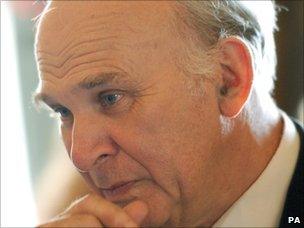Q&A: Squeeze on university places
- Published

Many will miss out on the university dream this year
The battle for university places is proving tougher than ever this year, with more prospective students battling for places.
How bad is the situation?
In July, Ucas, the organisation responsible for managing applications to higher education courses in the UK, said nearly 661,000 people had applied to start undergraduate degrees this September - nearly 69,000 more than at the same time last year, which was itself a record.
But with an ongoing crisis in the system of higher education funding, the number of places on degree courses has been rigidly capped for a second year in a row.
The record applications, added to severe budget cuts and the possibility of fines being imposed for universities that over-recruit, mean that university places are in short supply.
Under a system which began last year, universities recruiting more students than their allocated quota are charged £3,700 per student.
In England, 4,000 students were over-recruited last year, for which universities were fined more than £15m in total, according to the Higher Education Funding Council for England (HEFCE).
And some argue that the penalties will encourage universities to err on the side of caution in offering places and may lead to under-recruitment.
The Labour government promised 20,000 extra places for England's universities this academic year - mainly in science, engineering and maths. But the incoming government made things even tighter by halving these to about 10,000 - some of which are part-time.
The number of university applications in the UK hit a record high last year, with a total of 640,000 people applying (including through clearing) and 482,000 eventually accepted onto courses.
Why is there increased demand for university places?
Demand for university places has risen quickly over the past decade.
Labour's aim of getting 50% of school leavers to go onto higher education and the expansion in university places has made a degree an expectation rather than desire for many youngsters.
Add to that the effects of the recession - with school leavers and graduates facing a restrained jobs market and high levels of unemployment.
It is therefore hardly surprising that increasing numbers of people are choosing to study for a degree.
Meanwhile, applications are up about 23% for over-25s, suggesting people struggling in the jobs market are going back to education to retrain.
And the ranks are also swollen by last year's disappointed applicants - with a 24% increase in the number of previous applicants re-applying bringing the total to 56,960.
What does the squeeze mean?
Universities Minister David Willetts said more applicants than the 160,000 who did not get a place last year might be turned away this year, among them 3,500 who gained three As at A-level.
The complexities of the higher education funding system with its differences in allocation between England, Wales, Scotland and Northern Ireland makes calculating how many will miss out hard to get right.
Mr Curnock Cook has warned that more than 150,000 students were expected to miss out on a degree place this year.
And universities are expected to be less likely to accept students who just missed the grades required in their offers. Some are suggesting that re-takes will only be considered in exceptional circumstances.
What about clearing?
Clearing is the process where students who got worse - or better - grades than expected can ring around universities in the hope of securing any unallocated places.
The day after results day, figures from Ucas suggested up to 190,183 students were searching for places via clearing. At this time last year, nearly 142,000 were in this position.
However, Ucas chief executive Mary Curnock Cook said that about 70,000 of those who had received their results had rejected offers or withdrawn from their course applications.
So far 4,083 applicants have found a place through the clearing system. At the same time last year, the figure was 5,205. Several universities said they had fewer places available than in previous years, and some said most of the spaces had been snapped up on the first or second day of the process.
Five Scottish universities and two Welsh ones have said they will not offer places through clearing for the first time.

Mr Cable said students would have to pay more
Birmingham, Southampton, Bath, East Anglia and Imperial College London are expecting to have few, if any, places in clearing.
Last year, nearly 48,000 students found places through clearing, up from 44,000 the previous year.
Why not just create more places?
University education is expensive and the government says the funding is simply not there.
Universities are allocated funding through their funding bodies in the different nations.
In England, where the bulk of places are provided, students have their tuition fees and maintenance loans paid up-front for them by the government.
Universities are given about £11bn a year by the government, which works out at about £7,000 a year per student.
The students pay back less than half - £3,225 - in tuition fees. But favourable loan terms means a significant amount will be paid by the taxpayer.
Labour hugely expanded spending on higher education until its last year in office, when it cut back by £449m the projected budget for the year 2010-11.
As well as cutting the expansion in university places, the coalition government has said most government departments must cut 25% of their budgets over the next five years. As Business Secretary Vince Cable has said, further contraction is likely.
An independent review of the student funding and finance system, under Lord Browne, is due to report in the autumn.
It was set up to look at whether the current cap on tuition fees should be raised.
Whether it does that, or suggests a root-and-branch reform of the university funding system such as introducing a graduate tax, nobody knows for sure. But what is clear, as Mr Cable has warned, is that students will have to pay more.
What if you do not get a place - even through clearing?
Prospective students can wait for a year to re-apply, and work, travel or do voluntary work or an internship while they wait.
However, the job market is already crowded with graduates who are struggling to find work and taking more of the jobs school leavers might apply for.
The head of Ucas has suggested apprenticeships as an alternative option, but competition for schemes with strong career prospects is stiff.
Part-time study and distance-learning are also options. The Open University and Birkbeck University, which specialises in evening courses, have both reported a rise in applications from young people. Study at a further education college is also a possibility.
The National Exam Results helpline offers information, advice and support to anyone considering their options - call 0808 100 8000.